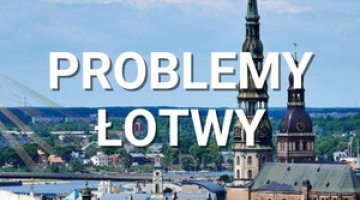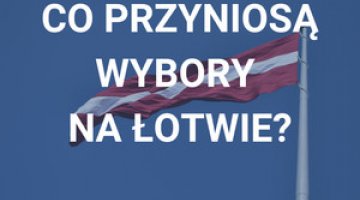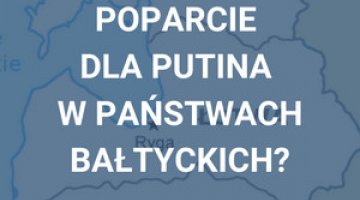Political intrigue casts shadow on presidential elections in Latvia
On 2 June, the Latvian parliament voted for a new president of the country. The president-elect is Andris Berzins, a businessman with little political experience but with strong support from Latvian oligarchs, who are controlling part of the political scene. These elections took place against the backdrop of what was a surprising decision from the outgoing president, Valdis Zatlers; to initiate a referendum on the dissolution of parliament, whose term started only 7 months ago. Zatlers was believed to be certain of re-election. However, on 28 he accused the MPs who would have elected him several days later of failing to counteract the appropriation of the state by oligarchs and ordered a referendum be held. The fact that Berzins was elected president indicates that the parliamentary majority is not interested in reducing the influence oligarchs have on politics, contrary to the expectations of the Latvian public.
Prime Minister Valdis Dombrovskis has distanced himself from the president-elect. Parliament is likely to be dissolved as a result of the referendum; hence the start of an election campaign in Latvia. Zatlers and Dombrovskis are likely to team up during the election campaign. The campaign may be rather heated, which has been signified by the political competition between the centre-right Unity party led by the prime minister and the parties representing the interests of the oligarchs, which became evident at the time of the presidential election.
Who is backing Berzins?
Strong links between business and politics have been characteristic of Latvia’s political scene since it restored independence. Parliament throughout all its terms so far has included political groupings which are either financially backed or directly led by ‘oligarchs’, the richest businessmen, who earned their fortunes by controlling the privatisation processes in the early 1990s, bribing public servants and MPs, holding stakes in the media and gaining an increasingly strong influence on each subsequent government. They have even started participating directly in politics and holding prominent state positions. International anti-corruption institutions have for many years been reproaching Latvia for its lack of successful action to ensure transparency in business and politics. Rivalry between influential oligarchs and the political parties they support has often destabilised government coalitions. It needs to be emphasised that criminal charges have been brought against the three most influential Latvian oligarchs, who are active in politics. This has seen them abandoning mutual rivalry to join forces in their political struggle against those groupings which demand their influence be curbed.
In the election, 53 of the 100 MPs voted for Berzins and 41 for Zatlers. Berzins owes his victory to support from the Harmony Centre, a party popular among the Russian minority in Latvia, and the Union of Greens and Farmers (which is at present in the governing coalition with the centre-right Unity and represents the interests of the mayor of Ventspils, oligarch Aivars Lembergs) and For a Good Latvia, a party established by two oligarchs and MPs, Andris Skele and Ainars Slesers, which has a modest representation in the Saeima. Valdis Zatlers was supported by Unity, led by prime minister Valdis Dombrovskis, and the nationalists.
The election of Bērziņš surprised the Latvian public because he has been present in political life for just one year (the Union of Greens and Farmers). He is often confused with a former prime minister, also named Andris Berzins. Earlier, the new president-elect for many years was the CEO of a large bank, Unibanka (presently SEB). However, there has been speculation for a long time about his links with a business and political lobby, known as the Valmiera group, composed of influential politicians and businessmen (including the former prime minister, Andris Skele). Since Berzins has also worked for one of the most powerful companies in the country, Latvenergo, he may still have connections with energy companies (Latvenergo and Latvijas gaze), which have a fundamental meaning for the Latvian economy and which are strongly influenced by Russia’s Gazprom.
The political intrigue is accompanying the presidential election
The presidential election was preceded by the surprising decision from President Valdis Zatlers to initiate a referendum concerning the dissolution of parliament whose term had started 7 months earlier. Zatlers, whose re-election seemed to be a foregone conclusion (the groupings which later supported Berzins had declared they would vote for him), unexpectedly accused the MPs who were to elect him as president several days later of failing to counteract the appropriation of the state by oligarchs and ordered a referendum be held. The direct reason for his decision was parliament’s refusal to allow police to search the flat of oligarch Ainars Slesers, an MP. However, this was primarily his reaction to the putting up of Berzins as a candidate one week before the election. The outgoing president’s recent engagement in the campaign against oligarchy contrasts with his previous complete lack of action in this area.
Most of the Latvian public reacted positively to Zatlers’s arguments for the need to dissolve parliament. Some citizens want to see him as the leader of public resistance against corruption and the influence of oligarchs. If this part of the electorate supports the president’s initiative in the referendum on 23 July (according to polls, this is exactly what should be expected), early parliamentary elections will be held in the second half of September. Valdis Zatlers has not announced what he is planning to do after his term has expired (on 7 July). The support he is receiving now from the popular prime minister Dombrovskis indicates that Zatlers could become engaged in the election campaign of the Unity party, which is likely to employ the slogans of combating corruption and oligarch schemes again in its election campaign.
This summer will be hot in Latvia
Unity, the party led by prime minister Dombrovskis, received the greatest support in the most recent parliamentary elections. Its campaign was based on dissociating Unity from both the parties representing the Russian minority and those backed by oligarchs. However, to form a government (which has been operating for seven months now), Dombrovskis had to accept the Union of Greens and Farmers as a coalition partner. This party is linked to Aigars Lembergs, who has been the mayor of Ventspils for more than 20 years, and in doing this Dombrovskis disappointed part of his electorate.
The background in which the presidential election was held, which has not been free from political intrigue, is a sign that the political campaign and the vying between the prime minister-led Unity and the oligarch and Russian minority parties are bound to be heated. Attempts at discrediting individual politicians, including the president-elect, are to be expected. The only party which may count on certain and stable support from its electorate is the Harmony Centre representing the Russian minority, which will once again stand a chance of winning parliamentary elections and entering a government coalition.
Appendix 1
Andris Berzins (born in 1944) was elected MP in 2010 as a candidate of the Union of Greens and Farmers. He is often mistaken for his namesake, Andris Berzins, a former prime minister and a present MP. He graduated from the Riga Technical University (major: Radio Engineering) and the University of Latvia. When Latvia was a Soviet republic, he worked in heavy industry (he was nominated director of the company, Elektrons), and then he held the function of deputy minister for municipal services for a short time (1988–1989). In 1990, he was elected to the Supreme Soviet of the Latvian SSR. When Latvia restored independence, he became engaged in business; in 1993 he was nominated president of Unibanka (which was recently taken over by Sweden’s SEB), and held this function for ten years. Then he held various positions, for example he was the chairman of the supervisory board of Latvenergo (a state-controlled monopoly in the energy sector). In 2006–2010, he was the president of the Latvian chamber of industry and commerce. Berzins is rich; he owns 30 pieces of real estate (including agricultural land and building investments). According to Latvian press reports, he receives the highest pension in Latvia.
Appendix 2
Political parties in Latvian parliament
|
Party
|
Characteristics
|
Number of seats in parliament
|
|
Unity (Vienotiba)
|
The main party in the governing coalition led by Prime Minister Valdis Dombrovskis (its coalition partner being the Union of Greens and Farmers). This centre-right party is presenting itself as an alternative to the rule of oligarchs and the Harmony Centre. This party supported Valdis Zatlers in the presidential election on 2 June 2011.
|
33
|
|
Harmony Centre (Saskanas centrs)
|
The largest opposition party. Ethnic Russians are predominant in this party. Its leader is the present mayor of Riga, Nils Usakovs, who is an ethnic Russian. It presents itself as a left-wing party, employing populist slogans of protecting the poorest and the rights of the Russian-speaking minority (35% of the population). This party supported Andris Berzins in the presidential election.
|
29
|
|
Union of Greens and Farmers (Zalo un Zemnieku savieniba )
|
A member of the governing coalition. This party represents the interests of the mayor of Ventspils, Aigars Lembergs.
This party supported Andris Berzins in the presidential election.
|
22
|
|
All for Latvia and For Fatherland and Freedom (Visu Latvijai – TB/LNNK)
|
An opposition party representing the political right and radical right circles. It resists most of all attempts of including the parties which represent the interests of the Russian-speaking population of the country in government coalitions.
It supported Valdis Zatlers in the presidential election.
|
8
|
|
For a Good Latvia (Par Labu Latviju)
|
An opposition party, an alliance of two oligarchs: Andris Skele and Ainars Slesers.
This party supported Andris Berzins in the presidential election.
|
8
|





